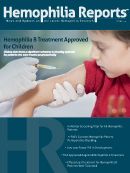Modified Plant Cell Treatment Effective in Animal Models of Hemophilia A
In mice models of hemophilia A, a modified tobacco plant diet was effective at prohibiting the development of inhibitors, according to research published in the journal Blood.

Plant cells can aid clotting factors in animal models of hemophilia A, according to research published in the journal Blood.
Researchers from University of Florida and the University of Pennsylvania developed a method to administer plant cells to animal models of hemophilia A which they hypothesized would be effective in teaching the blood to clot. Previously, the Pennsylvania team used a plant-based delivery method for drugs and bio-therapeutics that instructed the body to express specific proteins. In this study, they used the same method and used components of the factor VIII molecule. Before injecting into the tobacco plant chloroplasts, they fused FVIII and a DNA subunit. Then they ground up the plant matter and suspended them in a solution for injection.
The mice models of hemophilia A were treated with the solution injection twice a week for 2 months. After the observation period, they were compared to a control group that were given regular FVIII injections and fed unmodified plant material. The control group mice had higher levels of inhibitors than the modified plant-fed mice, which formed inhibitors up to 7 times lower. The modified plant-fed mice had more cytokines formed linked to suppressing immune responses, while control mice had more cytokines formed linked to triggering immune responses.
Later in the study, the investigators were able to transfer regulatory T cells from the modified plant-fed mice into normal mice. This transfer demonstrated reduced inhibitor formation, and the researchers believe the transfer contributed tolerance-inducing characteristics into the normal mice. The scientists next wanted to examine if the transfer process would work in reverse — they fed the modified plant material to mice that had already developed inhibitors. Over 2 or 3 months of receiving the plant material, these mice demonstrated reduced inhibitor formation and then a reversal of formation which decreased between 3- and 7-fold when compared to the control group.
The researchers pointed out that the treatment needs to be continued over time to maintain its effects, however it is still less expensive than current therapies. For human patients, the researchers plan to translate their findings into lettuce plants instead of tobacco plants.
“This is not a one-time treatment,” Henry Daniell, PhD, the senior author of the research, said in a University of Pennsylvania press release. “You need to do it repetitively to maintain the tolerance. With multi-million dollar funding from a global pharmaceutical company and their decades of expertise in bringing numerous protein therapeutics to the clinic, we’re excited to take lettuce capsules producing human blood-clotting factors to the clinic soon.”
The therapy for human patients would not be invasive, which is one of its many benefits.
“Oral tolerance is ideal is because you are feeding them something specific that addresses the problem and you don’t have to use drugs that suppress the immune system,” Roland Herzog, PhD, co-author of the study, explained in a University of Florida statement. “It’s not invasive. You’re not manipulating patients’ cells. It would be an ideal way to do it.”
